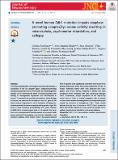Por favor, use este identificador para citar o enlazar a este item:
http://hdl.handle.net/10261/203617COMPARTIR / EXPORTAR:
 SHARE SHARE
 CORE
BASE CORE
BASE
|
|
| Visualizar otros formatos: MARC | Dublin Core | RDF | ORE | MODS | METS | DIDL | DATACITE | |

| Título: | A novel human Cdh1 mutation impairs anaphase promoting complex/cyclosome activity resulting in microcephaly, psychomotor retardation, and epilepsy |
Autor: | Rodríguez González, Cristina CSIC ORCID; Sánchez Morán, Irene CSIC ORCID; Álvarez, Sara; Tirado, Pilar; Fernández‐Mayoralas, Daniel M.; Calleja-Pérez, Beatriz; Almeida, Angeles CSIC ORCID; Fernández-Jaén, Alberto | Palabras clave: | Cdh1 Fzr1 Microcephaly Mutation Psychomotor retardation |
Fecha de publicación: | oct-2019 | Editor: | John Wiley & Sons | Citación: | Journal of Neurochemistry 151(1): 103-115 (2019) | Resumen: | The Fizzy-related protein 1 (Fzr1) gene encodes Cdh1 protein, a coactivator of the E3 ubiquitin ligase anaphase-promoting complex/cyclosome (APC/C). Previously, we found that genetic ablation of Fzr1 promotes the death of neural progenitor cells leading to neurogenesis impairment and microcephaly in mouse. To ascertain the possible translation of these findings in humans, we searched for mutations in the Fzr1 gene in 390 whole exomes sequenced in trio in individuals showing neurodevelopmental disorders compatible with a genetic origin. We found a novel missense (p.Asp187Gly) Fzr1 gene mutation (c.560A>G) in a heterozygous state in a 4-year-old boy, born from non-consanguineous Spanish parents, who presents with severe antenatal microcephaly, psychomotor retardation, and refractory epilepsy. Cdh1 protein levels in leucocytes isolated from the patient were significantly lower than those found in his parents. Expression of the Asp187Gly mutant form of Cdh1 in human embryonic kidney 293T cells produced less Cdh1 protein and APC/C activity, resulting in altered cell cycle distribution when compared with cells expressing wild-type Cdh1. Furthermore, ectopic expression of the Asp187Gly mutant form of Cdh1 in cortical progenitor cells in primary culture failed to abolish the enlargement of the replicative phase caused by knockout of endogenous Cdh1. These results indicate that the loss of function of APC/C-Cdh1 caused by Cdh1 Asp187Gly mutation is a new cause of prenatal microcephaly, psychomotor retardation, and severe epilepsy. Open science badges: This article has received a badge for *Open Materials* because it provided all relevant information to reproduce the study in the manuscript. The complete Open Science Disclosure form for this article can be found at the end of the article. More information about the Open Practices badges can be found at https://cos.io/our-services/open-science-badges/. (Figure presented.). Open Science: This manuscript was awarded with the Open Materials Badge. For more information see: https://cos.io/our-services/open-science-badges/. | Versión del editor: | http://dx.doi.org/10.1111/jnc.14828 | URI: | http://hdl.handle.net/10261/203617 | DOI: | 10.1111/jnc.14828 | Identificadores: | doi: 10.1111/jnc.14828 e-issn: 1471-4159 issn: 0022-3042 |
| Aparece en las colecciones: | (IBFG) Artículos |
Ficheros en este ítem:
| Fichero | Descripción | Tamaño | Formato | |
|---|---|---|---|---|
| jnc.14828.pdf | 768,54 kB | Adobe PDF |  Visualizar/Abrir |
CORE Recommender
PubMed Central
Citations
12
checked on 11-abr-2024
SCOPUSTM
Citations
14
checked on 16-abr-2024
WEB OF SCIENCETM
Citations
12
checked on 29-feb-2024
Page view(s)
182
checked on 19-abr-2024
Download(s)
189
checked on 19-abr-2024

